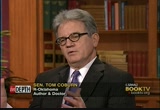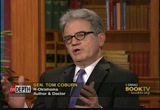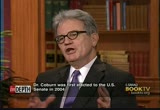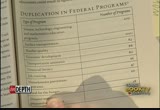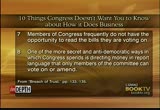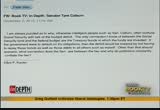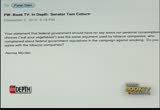tv Book TV In Depth CSPAN December 8, 2012 9:00am-12:00pm EST
9:00 am
if america reduced its international role. for an extended linked to various publications, 2012 notable books elections visit booktv's website booktv.org or our facebook page, facebook.com/booktv. >> up next, author, dr. and u.s. senator tom coburn, acclaimed author of breach of trust, talks about long-term deficit reduction, health care, the future of the republican party and more. ..
9:01 am
>> guest: that he could not raise the adequate amount of wheat that he wanted to. because the government had decided they were going to control wheat plantings. and so what he said was, okay, then i can raise wheat for my chickens. and he took it all the way to the supreme court and lost that battle. >> host: why do you recount that story in "the debt bomb"? >> guest: because it's a great example on the enumerated powers and the unwinding -- why do we find ourself in the place we're in now? how'd we get here, what do by -- we do about it, and what are the ramifications? the greatest way for the government to make something expensive is for the government to make it affordable. and all you have to do is look at the programs. what were the average inflationary costs of health care before we created medicare
9:02 am
and medicaid? they ran the same as every other aspect of our inflation. in other words, there was no differential between health care costs. now that we have a government program, what has happened is health care costs are two, sometimes three times the rate of the average inflation in the economy. so what you did is, number one, you had a supreme court ruling that it was in the best interests of the country to take away the liberty of individuals. and the congress had actually gone outside of the enumerated powers -- which lists very specifically what the congress can do -- and yet the supreme court held up the abandonment of the enumerated powers. and also the trumping of the tenth amendment. >> host: why -- when it comes to the commerce clause, you used that with supreme court justice
9:03 am
elena kagan, and you reprint that testimony, your back and forth with elena kagan in "the debt bomb." what was the question you asked can her about fruits and vegetables? >> well, the question i asked is could the government tell you, mandate to you how many fruits and vegetables you would eat a day? and it really arises is what's the role for the government in terms of our lives? can, in fact, the commerce clause be viewed so widely as what was done in filburn v. united states, can it be interpreted so widely that we could eventually get to the point where we could mandate? well, we're doing it. we're doing it right now, as a matter of fact, because in terms of what they'll feed in the school lunch program, we're having an uprising across the
9:04 am
country because of the rejection of what the government is saying, here's what you have to eat. here's what's available. so the point is our founders knew that for true liberty and freedom to be there, there had to be personal responsibility. and when the government dose beyond the level of -- goes beyond the level of a prudent exercise of government, i'm not against government, but i recognize there's limitations in the terms of what the government can do. but the limitation is based on what we can do well. and as you look at what we're doing, matter of fact, "the debt bomb" exposes that, the "back in black" that we put out shows that, and the oversight we've put out over the last eight years shows where we're not doing it well. so the idea was to raise the question in the minds of the readers of the book. the if you read the federalist papers, the founders described a very, very limited commerce
9:05 am
clause involvement of the federal government, a very, very limited expose of what the general welfare clause would be. we've taken those terms -- pardon me -- and markedly expanded them beyond what our founders intended. i mean, if you go to school and you're buying lunch at school and the usda out of washington is telling you what you can eat and what you can't eat rather than your parents and local school board, i would say a certain amount of freedom has been taken away and moved to washington. >> host: but what about the common good? wouldn't it be good to have less obesity? >> guest: sure. everybody's for less obesity. but do you think we can mandate less obesity by government
9:06 am
regulation? what that does is ignore the idea that there's personal responsibility and personal accountability. you know, we're gonna talk about the tragedy of american compassion, a book later on in this segment written by mar i -- marvin o las key, and can you grow that freedom without personal responsibility, personal accountability, undermining? and so there's a balance there, in my opinion having lived almost 65 years and seen what my freedom and my responsibility was when i was a young man versus what we've transferred to the federal government, i think it's very, very dangerous for the ultimate freedom of our country. and history would put that forward is if you look back on the history of republics, the same thing's happening to us that's happened to every other republic. as the government has grown,
9:07 am
freedom has been diminished. >> host: senator coburn, you write: >> guest: yeah. we -- our poet -- our motivations, actually, expand that a little bit, our motivations too often as members of congress is how do we please those people who will enable us to stay here. >> host: what's careerism? >> guest: careerism is looking at the next election to a greater and stronger point than looking at your oath of office and how you do what is best for the country in the long term regardless of how it affects your political career. >> host: is careerism, in your view, a form of corruption?
9:08 am
>> guest: no, i don't think it's corruption. i think it's natural human nature. the people of congress are great people by and far. well intentioned. they love our country. they want what is best for the country provided they can still have a say in it. and so you get the natural tension of do i do what's best for the country even though it hurts my political career? and those are pretty tough decisions. and only very courageous people will do that routinely. you know, when your desire is for position and power and the
9:09 am
original desire was well intentioned and well meaning and you confuse or rationalize that position against standing outside of that looking if i was not partisan, if i was not in a political position what would be the best position for the country and those two get conflicted because of our desire for position and power or a political career. so i'm not critical. i think public service is a wonderful thing. but we've transitioned in our country too often, especially in the senate, to people who have very limited exposure to the real world outside of the political one. and that's very different than what we had the first hundred years in our country's history. most of the people had broad ranges of experience in the
9:10 am
private sector and in other areas of life and brought that information, experience, wisdom, gray hair to solve the problems of the country. and that's, that's more limited now. i hardly will ever vote for somebody that's a career politician. you know, and the reason is i understand as a physician i know human nature, i see it, i see the -- i see both the positives and the negativesover it. but i also have got cannen to see as a senator and i saw some as a member of congress, because i wrote on this in "breach of trust" how that gets intersected and undermined and, ultimately, not in the best interests of the country. >> host: you wrote "breach of trust" about your time in the house. or you were elected in 1994, the so-called gingrich revolution.
9:11 am
going into congress in 1994 what was your enthusiasm level, what was your thought process? >> guest: i thought we were really going to fix and address the problems of our country. i thought we believed what we believed, what we campaigned on. and i was awakened to the fact that, you know, that's what we said, but as soon as we became a majority, we decided staying in power was more important than doing what we promised. and so consequently -- and you saw from after '96, what you saw was my party pretty well abandon spending restraints, or after '97, essentially, the budget deal of '97, abandon spending restraint. and one of the reasons that we're in trouble today has to do with republicans speaking one thing and doing the other. >> host: how long before you
9:12 am
were disillusioned? >> guest: you mean in the house? >> host: yes. >> guest: gosh, probably two years. two years. i mean, i saw some hints of it, i saw people, you know, the rudder starting to shift, how do we calculate -- how do we stay here, how do we enhance our majority. in other words, my thought is this, is it wonderfully okay to raise an election -- to lose an election if you do it based on principle and sticking to the core values that you promised your voters that you would do? >> host: in "breach of trust: how washington turns outsiders into insiders," you write:
9:13 am
>> host: do you want to address any of those first three? >> guest: well, let's address the third one first. if you have a transportation bill and they want your vote on the transportation bill, what they'll do is call you up and say where do you want to spend this 40 or 60 or $80 million? so here you as a member of congress can go and politically benefit either your weak areas by saying look at this road i built for your town or this new bridge i put over the water for you all. in other words, i can use the power of the purse to enhance my own standing personally. and when that was offered to me,
9:14 am
first of all, i tape recorded it and put it out -- >> host: and that was the tone phone call from the transportation committee, bud schuster was the chair at the time. >> guest: yeah. and i put it out, because there's no way i know where the stoplight ought to be in oklahoma. there's no way i know what the number one priority is. and so when this same thing happened in the senate not long after i came to the senate, i directed all the money that was transferred to me -- i think this it was $80 million -- to go to the state department of transportation director who is from oklahoma, who has the responsibility of making the priorities and working with the oklahoma legislature. but it is interesting, other than the interstate system and the areas where we truly have commerce, local roads in oklahoma, local bridges in oklahoma, how'd we ever get it to where the federal government was deciding what our priorities were going to be in those areas?
9:15 am
i mean, that's a real, that's a great example of how we've transferred power from citizens to washington, and we consume a portion of it and then come back, but then we'll tell you where you'll spend the money rather than the citizens of the state of oklahoma. deciding where their tax money will be spent. so, again, and i would tell you transportation costs a whole lot more to build a mile of highway today because we've tried to make it available, and it's become expensive because we've added all these rules and regulations, all these requirements. you know, a large portion, about 18% of the federal highway budget, doesn't go to build the first bridge, highway or road. it goes for enhancements. it's not something that the people of oklahoma necessarily want. they could do it if they wanted to, but we mandate the percentage you have to spend on
9:16 am
something other than that from a gas tax from putting gas in your car. to me, that's ludicrous. you know, "the debt bomb" is about what's getting ready to happen to our country, why it's getting ready to happen and what the possible solutions to get out of it are. here's a great example of how we got in trouble in the first place. because what our founders believed was that we were to have a very limited central government. and i absolutely believe that we should have a limited central government. but it should be authoritative in terms of the areas that we gave it responsibility. but beyond that what you do is you totally diminish all these laboratories of experimentation, all these regional differences when you take it and pull that power away and set it in washington. what you're doing is markedly diminishing the liberty and freedoms of the people outside of washington. >> host: is it tempting? is that money tempting?
9:17 am
>> guest: not for me. i mean, look, when i ran for the senate, one of my campaign themes is i'm not bringing anything home to oklahoma. and the reason is there's no money here. anything we send you home we're stealing from your children today. i mean, remember, out of the $3.6 trillion last year that we spent, $1.2 trillion of it we borrowed from our children. we didn't borrow e -- it from the chinese, we borrowed it from the people who will ultimately pay it back. so is it tempting to spend money and enhance yourself? i'm sure it is. but the point is, to me, it's a moral wrong to steal it from the next generation because what you're really doing is stealing their opportunity to be free. and if you look in the context of history, that's how every other republic died. we're doing the same things that every other republic experienced
9:18 am
before they collapsed. and the whole reason for "the debt bomb," the reason i wrote it is that if people can understand where we are and how we got there and what the solutions to it are, i mean, we go through "back in black," and we list nine trillion. we got the gao to outline for us areas of duplication in the government. the last report will come in april of this year. they've already identified 200 areas where we have multiple programs doing exactly the same thing. with no oversight by congress, no metrics to see if it's working. and that comes close to $200 billion a year in wasted money, wasted money that is not enhancing what it was intended to do or not facilitating what it was intended to do.
9:19 am
>> host: in "the debt bomb," you have duplication in federal programs, science, technology, engineering and mathematics programs, there are 209 of those. service transportation, 100 plus. teacher quality, 82 programs. economic development, 88. transportation assistance, 80. financial literacy, 56 different programs. job training, 47 different job--training programs. homelessness prevention and assistance, 20 programs. food for the hungry, 18, and disaster response preparedness/fema, 7 different programs. >> guest: well, it's not, it's not just outlandish that we have that many programs, what is also outlandish is we don't know if they're working. because when they're passed, there's nothing that says you have to have a metric to see if it's accomplishing the goal, and the biggest defect of the congress since i've been here has been the total lack of oversight of most of the
9:20 am
programs. >> host: you recount in "the debt bomb" a story about taking an amendment to the senate floor to get rid of some of these duplication, duplicative programs. what happened? >> guest: uh -- >> host: did it pass? >> guest: well, we have had one more $2 million pass, but all the rest have failed. >> host: why? >> guest: because all of these programs have constituencies. by the way, we found another 52 programs for job training for the disabled. so we actually have 106 job-training programs or 109 that we spend $24 billion a year on. and we pretty well demonstrated most -- in oklahoma we did, we studied 'em all in oklahoma, i had my field reps go out and say, well, how are these working in oklahoma. what we pretty well have figured out is the federal programs don't work. the ones outside of the federal government that the states run themselves do work.
9:21 am
so, you know, the question is, is if there's a role for the federal government in job training, shouldn't it be efficient, shouldn't it be effective, shouldn't congress be looking to see how it works, shouldn't we have method ricks on it -- metrics on it, and should we have 57 or 47 different programs that cost $19 billion a year? shouldn't we know if we're getting value for our money? and so what happens in congress is if you question that, the first thing people will do is you don't want people to get job training. in other words, you get demonized. so i've pretty well gotten used to being demonized. there's not a subject i won't take on if i think it is appropriate for us to look at it. but most people won't do that because they don't want to get labeled as saying i don't want to help people with job training. i don't want to be accused of not solving the problem. so, therefore, cover my eyes, cover my ears, cover my mouth
9:22 am
and let it continue. i mean, ask yourself this: thomas jefferson said there's no role for the federal government in education. if we want one, we need to pass an amendment to the constitution to do it. now, he was for changing the constitution to get a role for education. but he said how is it that we have all these teacher training programs run by the federal government costing billion dollars a year run out of washington to train teachers who are actually a local and community and state responsibility? how'd we get there? and, oh, by the way, does anybody know if they're actually improving teacher training? actually improving the skills of our teachers? so there's really two questions. one is what's the constitutional role of the federal government in that and, number two, if there's a legitimate role -- or
9:23 am
even if there isn't, you're spending the money -- shouldn't you know, shouldn't when we pass this say here's the metrics which we're going to use to measure whether or not a teacher's effective or whether the teacher training programs are effective? >> host: this month on our booktv "in depth" program, senator tom coburn, who is also a medical doctor and an author. he wrote "the debt bomb" this past year. "breach of trust" became out in 2003, and he's also a author of several different long-form reports including this one, "back in black," which came out in july of 2011. he will be our guest for the next two-and-a-half hours. we're going to put the numbers up on the screen if you'd like to join our conversation. 202 is the area code, 585-3880 in the east and central time zones, 585-3881 for those of you in the mountain and pacific time zones. and, of course, you can reach us via e-mail, twitter and facebook. you can make comments there on our social media platforms.
9:24 am
booktv@cspan.org is our e-mail address, our twitter handle is @booktv. and finally on facebook, facebook.com/booktv. you'll see it posted right there on our home page. you can add a comment, and we'll get to as many of those as possible. back to "breach of trust," senator coburn, a couple more of the -- >> guest: that book, by the way, is coming out in paperback this january. >> host: there you go. just in time for christmas or the new year. back to 10 things congress doesn't want you to know about how it does business -6r79
9:25 am
>>ing >> guest: well, if you look at the appropriation bills which have not been done the last two years because of the political dynamic that's been going on and you go in and say we're appropriating x amount of money and then you look at how many programs, it's actually up to over $350 billion now of programs that are funded that are not authorized by the congress. which tells you that there's an imbalance in congress, is how do we appropriate funds for a program that we haven't said we should be spending money on. and it tells you the power of the appropriation committees and the power of pork or benefit going back to the states of what's most important. is it most important to actually look good in oklahoma by the amount of money that i can direct there? or is it more important to think
9:26 am
9:27 am
>> guest: those are all true. >> host: the budget resolution, we're about to begin that season in february. is it a waste of time? >> guest: no. if -- look, right now we have a $3.65 trillion spending. the big criticism of the last two years is congress is gridlocked. oh, really? how'd we authorize spending $3.65 trillion? what we're gridlocked in is spending money that we don't have on things or that are not absolutely necessary. that's what we're gridlocked over. and we're gridlocked over that so that we can make ourselves look good to our constituencies. so there's no gridlock when it comes to spending your kids' future in washington. we wouldn't have spent 3.6 trillion if we'd have had a budget last year. but we did a continuing resolution that passed which
9:28 am
means it's bipartisan, passed a republican house and a democratic senate, and the president signed it, and yet we borrowed $1.2 trillion that we didn't have of which i would contend 600 billion of it was wasted. was literally did no benefit directly for the citizens of this country other than those who took the money to administer or develop or give out the program. so, you know, in a wand you could look with wand and just say every program stand up that's actually effective and efficient, and what you'd see is minimal. and the reason that that's so is members of congress haven't oversighted, members of congress haven't done their job. they turn a blind eye and say it's hard to oversight, emphasize i'm going to get criticism when i do. so, therefore, let it go. so it goes back.
9:29 am
now we're now in that cr last year of $350 billion worth of programs were appropriated money that have either never been authorized by congress, or the authorization had lapsed. so it means the authorizing committees in congress aren't working. because if we're going to appropriate money whether it's authorized or not, why not just have an authorizing appropriating committee and put them all into one? so we totally ignore our own rules. >> host: how much fear is there among members of congress? of their constituents, of criticism, of not being reelected? >> guest: well, i think it runs the gamut. but i think you need to look at maybe a larger perspective is, you know, i was a businessman long before i was a physician, built a business. i became a physician as an older
9:30 am
individual, went -- i was known as grandpa in my medical school class and practiced for 25 years. my goal was to be a physician. i wasn't at the risk of my populace other than my reputation with my physicians -- my patients. so if you put it in context, it depends on what the goal of a house member of the house of representatives or a senator is. if the goal is to fix the problems in the country, to create at least as good a future for the next generation that follows us as we've had, and if that goal is above your personal goal of getting an office that has notoriety, power and position, then you're going to do fine, because you're going to keep that fear in perspective. when you, your number one goal is the position or the notoriety
9:31 am
and the secondary goal which helped you get to that goal is to secure the future, what happens is is how you value your position on certain policies changes. that's not impure. that's not terrible. that's just human nature. so i make the point in "the debt bomb" is if you're ever going to solve this problem, if we're ever gonna, if we're ever gonna secure our liberty and the freedoms for our kids and our grandkids, gotta quit sending career politicians here. >> host: senator coburn, what -- did you get any hostile reaction from your colleagues from "the debt bomb" or "breach of trust"? >> guest: no. well, i did on "breach of trust," but i don't think many of my colleagues have read "the debt bomb." i'm sitting here talking about
9:32 am
this with you, i make speeches on the floor. i'm okay to take the consternation and criticism of my colleagues if i actually think our country is in trouble -- and it is in trouble. you know, we're bankrupt. you know, there's a great article. if you take generally-accepted accounting principles, the same thing c-span has to operate under, the same thing every other business has to operate, most county governments operate under, we right now have $88 trillion of things we're going to have to pay for, we have no idea where we're going to get the money over the next 75 years. 88 trillion. you know, that's about 1.05 trillion more in bills coming due than what we have over the next 75 years. if you didn't grow the government or the economy at all. why have we put ourself in that position? and so the fact is, is we're
9:33 am
now -- the federal reserve has increased its balance sheet. authorize, it's created $2 trillion worth of funny money. they printed $2 trillion worth of money. and ultimately, the pain of that is going to fall on the middle class and the very poor in this country. and it's gonna defeat what both parties say they want. and yet we don't have the courage today to make the tough choices even if it means we lose our seats to secure the future for this country. we put ourselves first instead of the country first. it is not hard. any american citizen if they read "back in black," they can go to our web site and read it, there's a lot of common sense ways to save money in there. just this last week the air force announced -- this is a great example. in the federal government this year we're going to spend $64 billion on i.t. projects.
9:34 am
that's $64 billion. the gao says at least half of that will be wasted. in other words, it'll never get completed, it'll never do what it's supposed to do. in "back in black" we had a program in the air force that said you ought to cancel this. we said this two years ago. you ought to cancel this, because it's never going to work, all right? here's how inefficient government is. this last week the air force canceled it finally. they spent another $100 million on it before they canceled it. they paid a settlement fee to cancel it of $8 million. but two things didn't happen. the person that was responsible for that contract didn't get fired and wasn't held accountable, and the company that didn't provide the service didn't get sued to get our money back, the taxpayers of this country. nobody runs their household that way. most state governments don't operate that way.
9:35 am
but we are totally incompetent when it comes to spending america's taxpayers' money. so why would we continue to waste $32 billion a year on i.t. programs that don't work for the federal government? you know, that's 60% of what they want to take additionally out of the pentagon. and that's government wide. so why would we do that? where's the leadership in the congress to say we're gonna get this stopped? we're going to have a special subcommittee that looks at this, oversight it, look at the bad actors, look at the bad actors in the government, and we're going to demand the people that make those decision get fired, and the companies that are not performing pay the money back. none of that happens. so you can defraud the federal government, you cannot be perform on a contract, and you can do it with impunity. and that's because members of congress are basically not willing or inexperienced to not know that you ought to be able
9:36 am
to hold people accountable for what they say they're going to do. whether it's a federal employee, a procurement employee or the company that's providing it. and that's just one example that happened this week. >> host: senator coburn, what was of the business you built before you went to medical school? >> guest: my father started a machinery manufacturing business, and i started an op thalamic lens, plastic lens, glass lens and interocular lens division of that. and i did that, actually, in southern virginia. i lived up here for ten years, from 19 -- what was it, '69, the summer of '69 through 2008. >> host: does that company still exist? >> guest: it's been sold. it was sold, and then parts of it were sold, so portions still exist. >> host: how old were you when you went to medical school? >> guest: 32. >> host: and what occurred to you to go to medical school at 32? >> guest: well, first of all, i'd kind of had fun on the
9:37 am
business side and really had a downer when the business was sold. i was working for other people, and i was used to making decisions that actually built a pretty good-sized business and pretty profitable, and i saw that business being torn apart by people who didn't have an interest in the business, but wanted the profits only rather than the product and price and the service. >> host: and eight years in medical school? >> guest: seven. >> host: and practiced for 25 years? are you still a practicing doctor? >> guest: this is the first year i have not practiced. >> host: are you retired officially, or are you -- >> guest: well, i couldn't afford to continue paying the malpractice insurance. and as a senator, i can't bill, i can't even offset the cost, so it was money straight out of my pocket after tax money, so it was pretty difficult. >> host: as a senator, you're not allowed to earn an income separate as a doctor? >> guest: no. >> host: have you leave the senate, do you plan on going back to medical?
9:38 am
>> guest: it'll depend how far behind i am, depend on what my skills are. i'm continuing to do some education. if i assess i wouldn't want me taking care of me, i won't go back into practice. >> host: senator coburn, where'd you grow up? >> guest: i was born in casper, wyoming, and grew up in oklahoma, a town called muskogee. >> host: and you mentioned your father built a business, what'd your mother do? >> guest: my mother raised four kids. >> host: and are you married? >> guest: i am. i'm married, i have a lovely wife, my high school sweetheart and three daughters, three sons-in-laws and seven grandchild. >> host: does your wife live back in muskogee? >> guest: yes, i go home every weekend. this is an exceptional weekend that i stayed here for this show, but i commute every weekend. and i need that. both emotionally and mentally to get back in the perspective of what people outside of
9:39 am
washington think. you know, to me, i think there's a dearth of common sense here or a void of common sense. and i can go back home, and, you know, i'll go to a barbecue place in muskogee, oklahoma, and i'll get all sorts of good advice there from people who are walking in overalls or their mechanic's clothes or whatever it is. i can learn a lot by being home. >> host: in "breach of trust," you write: >> host: typical meeting with constituents or business groups begin with them showering praise at the feet of tear representativement -- their representative. >> guest: well, if you want something, what's the best way to do it, sugar or sauer? but it's the -- i guess i would say is it's important in life
9:40 am
where you get your strokes. and if you get your strokes from your job or from other people, you're gonna have a tough time in life, because you're going to make some critical moral mistakes. i get my strokes from my faith and my family, and i think my faith especially allows me to stand stronger when i'm attacked. because i really think about, i really pray about and i really try to think long term. i'm not running again ever for a political office. when i ran for the senate, i said i won't serve more than two terms. it was a tough decision for me to do this a second six years. so, you know, to me i don't have to face the voters. so i can speak pretty well plain. but the question ought to be asked is why can't you speak
9:41 am
plain if you are meeting the voters, facing the voters? where's the moral courage and character which is what i think is really lacking not just in our elected leaders, but across a great portion of our country in terms of those character traits that will better us all and secure our future. >> host: you talk about your faith. are you a christian? >> guest: i am. >> host: when it comes to constituents and being the center of the universe as a member of congress, have you ever had a lapse where you've gone in for that? >> guest: oh, sure. look, it's easy to fall prey to -- i mean, that's the struggle of all our lives, isn't it? that we put ourselves first or somebody else first. i mean, the essence of a well-lived life is what you do for other people, not what you do for yourself. i mean, you're not going to be measured on what -- how you gain.
9:42 am
you're going to be measured on how you help other people gain. and so it's easy to fall into that really deceitful trap of putting you first. and what i've actually found in life is my most contented moments is when i'm giving my life away to somebody else rather than building up my own life. >> host: what's the inner ring? final question before we go to calls. >> guest: well, the pursuit of the inner ring, you know, is the idea that people work continually to try to achieve a level of being in the center, in the know, making the critical decisions. and what do you do to get there? and, you know, kind of like c.s. lewis said it's kind of like peeling an onion. first, you take the wrapper off
9:43 am
the onion, and then you peel every layer. and when you've got the last layer there, what do you have? there's nothing left. you've taken every layer off. and so it's this false pursuit is probably the paradox is if you don't pursue the inner ring and you pursue giving your life to other people, that you're gonna be in the inner ring. >> host: senator tom coburn is our guest on booktv on c-span2. tom in downers grove, illinois, you're the first caller. hi, tom. >> caller: hello. how you doing? >> host: good. >> guest: fine. >> caller: i am a -- i work at social security, i'm a claims representative. i think that there is so much we can do. i think we should go back to 1935. we can't support these people. we can't support people having
9:44 am
four wives, people that are 65 having kids. we can't support people deciding at 66 going from the widows to retirement. don't raise the rate. go back to 1935. >> host: tom, when you say don't raise the rate, which rate are you talking about? >> guest: the age. -- >> caller: the age. because if you raise the age, because you're gonna have, like, roofers, construction workers, people who do manual labor, they're going to be applying for disability at 62 and raise the rates. because -- >> host: all right. apologize. i thought we had finished with you. senator coburn, do you believe that the social security age should be raised? >> guest: i think the social security age should be raised, but very, very slowly.
9:45 am
but i think you can do what he's worried about, the guys who really do forced, heavy manual labor, you can create a category that qualifies them not for disability. but he raises a great question. actually, he has a great idea. if you go back to the qualifications for social security that were set in 1935, remember retirement was at 65. right? average life expectancy was 64. we -- and this is a great example. it's a little bit critical, but it shows you what career politics have done. what we've done through the years is add benefits to social security without adding a track stream to pay for it. and i'll give you a couple examples. today the people who are on social security -- i'm not talking disability, i'm not talking ssi, i'm not talking
9:46 am
survivor's benefits, i'm talking social security -- will collect $21 trillion more in real dollars than they put in. in inflation-adjusted -- they'll get paid $21 trillion more than they put in. and that's gonna grow. that's just social security. if you look at social security disability, one in seventeen people in this country today are collecting social security disability. there's not many people in oklahoma that i ask who actually believe one out of every seventeen people in this country are disabled. so what happened? how'd we get it to where we have one many seventeen people -- one in seven people people in this country on disability? that's congress' problem. congress has failed to oversight. and so, you know, during the last four years we've added more people to social security
9:47 am
disability than we've created in terms of new jobs. most people don't realize that. and it's my belief that some 30% of those are not truly disabled according to the law. so we have all these problems. and i think your caller's suggestion to go back and look at what our commitment was in 1935 and try to compare it to what our commitments are today and how do we do that and how do we -- the people who work at social security are great people. the problem is the judges hardly ever listen to 'em. somebody going to disability has already been denied twice by professionals at the social security administration. and then what we have is judge cans who actually -- judges who actually probably a third of the time don't do the correct work and follow the guidelines that are set out for 'em. i'm talking administrative law judges. and so we've seen this ballooning disability payments which, by the way, medicare
9:48 am
disability trust fund will be out of money in two years. and at the end of 2013 -- at the end of 2014 we'll be totally out of money. which means everybody who's truly disabled will be getting a reduction in the amount of hair payments every month -- of their payments every month. so, you know, the social security taxes on your salary over the next 18 years are scheduled to go to $198,000. in other words, that will be taxed up on to $198,000. and eventually we'll have to go higher than that. but when we do that, those paying those higher amounts are actually getting paid out more. so we have to figure out a way to fund that, go back to a point in "breach of trust." we get excess monies up until
9:49 am
2010 in social security. the government wrote an iou, and then we turned around rather than save that money, we turned around and spent it. because johnson created a unified budget. so we no longer have that firewall. and so all of a sudden now we owe $2.6 trillion to social security that we're going to to have to go borrow as social security unwinds, which is around 2030. the regular social security program. >> host: matthew posts on our facebook page, senate coburn, three questions. one, does social security and other social insurance programs like medicare and medicaid infringe on personal responsibility? number two, cbo reports that federal health spending will dominate mandatory spending by the mid 2030s. we'll just go with two of his questions. >> guest: well, if you think, you know, there's been a lot of psychological and sociological research on this. if you think somebody else will
9:50 am
take care of you and it's your government saying we will, then you're less likely to plan or prepare for that. and cbo is right, you know, that's why the coming tsunami of my generation which i will hit 65 in march and, you know, there's three and a half million of us this next year that become eligible for medicare, and the next year three and a half million of us become eligible for social security because that was in the tip o'neill/reagan fix, that's why the demographics are so important when you have health care costs rising. so it's a hard question. what the government has done has undermined our personal responsibility. because if i can pay a flat fee at the beginning of a year or
9:51 am
monthly to where i have no other payments on my health care if i'm on medicare and i don't have to worry about it, most of the time i'm gonna do that. but what does that do to the consumption or overconsumption of health care? now, a lot of your listeners will be offended at this, but when we study it, we know it's true. if you're a medicare patient and don't have a supplemental policy and have the exact same disease set as one that does, exactly the same outcomes except the ones with supplemental policies consume 23% more medicare dollars. what does that tell us? what that tells us is if we know we're not paying any more for something, then we'll tend to overconsume it. or we'll be less frugal. if you're telling me i can go to the mall this afternoon after we finish here and buy my christmas
9:52 am
presents on your credit card, will i be as frugal with your credit card as i would with mine? and the answer is human nature, and all of the studies show, no, you're not. and so, you know, what we have to do is we've to look -- there's a second thing that i think is important. when we undermine personal responsibility of individuals, we actually often times don't-help 'em. we actually hurt 'em. because what we do is we put a glass ceiling on the ability for them to attain. i have this young constituent in tulsa, oklahoma, who is a young african-american male whose mother's boyfriend hit him when he was, i can't remember, a teenager and broke his neck. he became a quadriplegic. and he's worked very hard the rest of his life, but he was caught in this trap. he works for one of the oil companies in tulsa.
9:53 am
if he got a raise because he's quadriplegic and he's single, he has to have help. if he got a raise, he would lose his medicaid help for his health care. and i'm talking if you're quadriplegic, you do need somebody to help you at nights, mornings, etc. what's our program? our program is if you get to the next point, you lose it all. rather than have a program that tapers off your benefit as you rise in your income. so we don't have that anywhere in the country where we can meaningfully encourage people to grow and achieve what they can, and yet we have these flat takeoffs. same thing on disability. if you earn a certain amount, you lose your disability. and maybe, maybe you could lose a portion of it and continue to expand your horizons and your capabilities and accomplishments to where you eventually could
9:54 am
get off of it. so we have all these things. and so what we've had, we have a young guy in oklahoma by the name of jason price who works with our disabled. and over the last several years he's had 4,000 people he's put the work that were truly disabled. and about 1800 of them right now are totally off of disability. well, what he's doing is he's allowing them to accomplish things rather than putting the ceiling that says, no, you can't do this. but he's a state program, he has nothing to do with the federal government. and so it's, you know, the tragedy -- and that's why i'm interested in talking about the tragedy of american compassion -- the tragedy is people don't achieve what they possibly could because we put a limit on what they can do because they participate in something. rather than being a helping hand, we've become a supplier and said once you do x, we're no longer your supplier. >> host: next call comes from chuck in casper, wyoming.
9:55 am
>> caller: senator coburn, i'm calling from the city of of your birth. >> guest: you are. natrona county. >> caller: definitely. i respect you as a true citizen legislator. you use the floor and your position so effectively, and that's why i'd like to get your opinion about the future of the republican party and the conservative movement. i'm very interested in the idea of returning to what in the 1970s and '80s was called sagebrush conservativism, this idea that conservativeisn in a way that people will still be focused -- will stop being so focused on the federal government solving so many problems and focus on solving those problems locally, kind of what you were talking about earlier about totally local issues being decided out of washington. and that makes sagebrush conservativism populace in a different kind of way than the word is used. people will realize that
9:56 am
government trusts them to solve their own problems. and i just was wondering how you define sagebrush conservativism and what the republican party is doing now branding wise to fully prevent it from being a sagebrush party. and you mentioned in the press conference for the "back in black" deficit reduction plan a ton of times that this isn't a budget. and is there a way you could also write a proposed budget that would be in a similar format? >> guest: well, several people have taken lots of what's in "back in black," senator mike lee, senator rand paul and done same thing, $9-$10 trillion over ten years. so, yes, it can be done. since i'm not on the budget committee, i chose not to do that, but you could implement what's in "back in black" and negotiate off that. and by the way, there's a
9:57 am
trillion dollars in revenue increases. so we've had that out there for a year and a half, almost two years where we think it's appropriate that we see revenue actually across the board the way it should be rather than the well heeled and sometimes the nonwell heeled getting a leg up on those in the system. you know, i'm not a big party guy. i'm a big freedom and liberty person. i've made my share of mistakes as a senator in terms of some of my votes. but i think the founding principles ought to be what we ought to be embracing. and, you know, history tells us that republics don't survive when you no longer have the character traits and the personal responsibilities that are necessary for that. so you could have a sagebrush/conservative/populist movement, but it would have to be embraced across the country that says we would like to have some of our freedoms back, and with that we would take on more
9:58 am
responsibility. but i went to bed thinking we were more a country to the right, that we may be past the point where all republics die when they can vote things for the treasury, then the fiscal calamity happens, and ultimately republic crashes. i'm not saying it's going the happen to us, but i think that's certainly a threat, and if you look at our budget deficits and you look at our risk for the debt that we have, i think we're at real risk. that's why i wrote the debt bomb. i wanted people to really see what's going to happen to us, and what's really going to happen to us is the decimation of the o middle class and all the support programs that we have for the very poor in this country are going to be lessened as a consequence of us not living within our means.
9:59 am
>> host: senator coburn, you say you're not much of a party guy. jesse tweets in to you: how can republicans learn again how to effectively message from the contract with america? >> guest: well, you know, one of my comments after the election is people don't care what you think until they know that you care. and i don't think republicans articulated what they were for and what was important and what was at stake. i, actually, my belief is we're going to have to suffer some of the consequences of our poor governing over both the republican and democratic administrations. and when those consequences start happening -- and i think they've been happening the last two years and they're gonna be much worse the next two -- that
10:00 am
people will either awaken or give up. my -- i have some real worries about what happens to us when things change in this country in terms of unwinding of civil discourse. i think we run the risk of that if, in fact, we're not out there really communicating what is at the basics of us living together, working together and how we do that. and when we so demonize each side to undermine where we know that's not the intent, but when we do it in such a way, what you do is you create vast, new extremes on either side that i think are dangerous for our country. ..
10:01 am
10:02 am
overnight. >> guest: it's important when we go to help somebody that we don't just help their immediate need, that we give them the courage, the confidence and support to help themselves. and my contention is, is too often in our hearts of compassion, our well-meaning this, that we have lost a lot of the ability to allow people to help themselves. because senator jeff sessions just put out, in i think october, the senate budget committee look at all the programs and what the average family beneficiary was on all the social welfare programs, it's around $50,000 a year. her family. think about that.
10:03 am
-- per family. that's without taxes. that's greater than the family income in the united states. so we have now moved those, and this is not tonight anybody who really needs our help. but what we have now done is we have a safety net that a sequel -- that is equal to average per capita income in this country. and so what that does is it takes away any incentive to better yourself because you are equal with everybody else in terms of benefits. that's significant. very significant in terms of motivations, in terms of people bettering themselves, in terms of people reaching higher. that's a worrisome statistic host back shannon, portland, oregon, good afternoon. this is booktv on c-span2. >> caller: hello.
10:04 am
i want to start off by saying you're a great men of integrity and it's a pleasure to talk to you. >> guest: thank you. >> caller: i'm an fdr democrat, and we have crossed the bridge before although obvious it wasn't quite as great a situation when it comes to the debt. when you're talking that $88 trillion. we know that money can't be paid back. we're just trying to purchase our way out of it. so, what's wrong with going back to what fdr did in doing large-scale infrastructure projects to put people back to work, what have a real living wage so that we can start to pay down the debt? >> guest: i don't think there's anything wrong with that but you can't do both. we don't have the money to do both. what you have to do is give back some of what we are doing to be able to do that. and remember, much of what we did under fdr was, we had a much
10:05 am
larger component of labor than what we do today. if you think about building dams are building roads and building bridges, it's much -- i would embrace that if we did that on balance to where we can do it, of creating that, but i would also say i probably could think of the administered that if he did have a per se basis rather than through the federal government. the priorities that were set by the stage rather than federal government. what was important and less to manage it. there's a big difference in the cost of living in this country so what you would do, and we never take independent -- consideration except in medicare payment peace. we don't take that into consideration terms of any of the other projects we do. i would not project that out of hand at all. >> host: abraham, manchester tennessee please go ahead with your questions or comments for senator coburn. >> caller: thank you for taking my call. i was calling regarding a quote from the. the quote begins i'm a fan of the jack welsh principle and
10:06 am
reverser congress, fire 90% of members every election and only keep the 10% who work for you. my question is do you consider yourself the 10%, and can you elaborate on what specifically you have done to reduce, to help reduce our government debt? >> guest: i would be happy to. to quote a the debt bomb. all the have to do is look at what my host has out in front of him. nobody in the senate or in congress has done more oversight than i have are my staff has. we've looked at years when i was a majority member and committee chair. we did more oversight in those two years, 2005 and six than the rest than the entire senate get. in terms of looking at where the problems are. my contention is, is if the american people knew what i
10:07 am
knew, you would fire 90% of us. you may if a fire 100% of us, but the fact is, as large amounts of your future and your children's future is being wasted everyday because we won't do the hard work of one, identifying the waste, and then number two, changing the programs and put in metrics so they don't waste the money and they actually accomplish something. i've said this. tomorrow, i could create $600 billion worth of cuts that nobody in america would feel except for the people are directly getting the money that we are spending on administering the programs. and i would invite you to go to my website and look at all the oversight that we've done, we've offered more eminence in the senate than anybody else to eliminate waste and duplication and fraud. go look at those and then ask yourself why the other 97% -- doesn't matter what party they're in, haven't in the same thing. because if they're doing the same thing can what i think you'd see is a totally different
10:08 am
congress. and the problem is as i debate on the floor, and there maybe two or three senators, the rest of the senators don't know what. their staff will look at because they're too busy can't figure out they please a state rather than to govern the country. >> host: here's some of senator coburn's reports, subsidies of the rich and famous, "money for nothing." we showed you "back in black" but that was a 600 page report. did you think about publishing that in book form? >> guest: not really because i did that with federal money and that was spent a ton of federal money to do. and people can get on the website. you can go, go through that. it's in a searchable, it's easy to look. but aiming, there's $9 trillion, a chilean of it in saving some interest, but there's a trillion dollars worth of tax cuts, tax increases and revenue enhancements, and $7 trillion
10:09 am
worth of spending reductions which would put us in 10 years balance our budget and 10 years after that pay off the debt. >> host: when you talk about tax increases, and revenue enhancements, what would you be in support of? >> guest: if you look at the one thing that we put out in terms of the subsidies for the rich and famous, what a lot of people don't realize is the well-connected and well-heeled in washington create benefits in the tax code that benefit themselves. doesn't benefit the average business. doesn't benefit the average person. and so we outlined in that section of the rich and famous, if you go through everything the very wealthy get back from the federal government, and some of that is medicare and social security. i readily admit that, but most of it is not. for example, lets take mortgage home deduction.
10:10 am
if you look at that by a cut off a 200,000 the worth of income year, it looks like those under 200,000 get the majority of it. but when you look at it, the average household income in this country is around $51,000 right now. it's gone down $4000 in the last five years, if you were to look at that, at the average for the average american, everybody above that takes about 85%. so that's not for the average american. that's for the more well-to-do american. so who, who, who is going to support that? we can't have home-building without a mortgage deduction. what most people don't realize in canada you get no mortgage interest deduction. right? there's no. have a higher homeownership rate than we do. they did before the downturn and they do now after the downturn. so what is the mortgage interest deduction for the benefit of homeowners, or was it for the
10:11 am
benefit of home builders? or wasn't for the benefit of the very wealthy? we are to ask those questions and know we're talking about before we just routinely say we've got to the mortgage interest deduction. and we ought to ask who does this affect? so if you just cannot go up the income scale, what you see is a vast majority of the cody people making one and a half or two times with the average the average family in this country makes. >> host: according to this report, mortgage interest deducted by millionaires in 2006-2009, in 2007 taxpayer costs to the treasury of mortgage interest deducted by millionaires, $8.6 billion. in 2009, it dropped because of the fiscal crisis, $4.4 billion was the cost to the treasury. 143,441, millionaires that your took mortgage interest deductions. and oh, by the way, some of
10:12 am
those were second homes that were jobs. >> guest: floating homes. swimming, so it out to ask the real question, do we really want a fairer tax code and to we treat everybody the same and proportionally the same? and i would say on the mortgage deduction we don't. >> host: gambling losses deducted by millionaires, $4.1 billion, average amount of per billion or, $504,000 here. >> guest: so why should we allow a deduction or losing on the game of chance? if you go buy a lottery you can't deduct that. the cost of a lottery ticket. so here's a way to get 10 million, $15 billion a year. start being honest and transparent with what we're doing with the tax code. i don't think we ought to raise
10:13 am
rates. i think we ought to do some significant adjustments to what we do with the tax code. because it isn't fair, and we have legislated to the benefit. ivory so it was attacked because i went after the ethanol, you know, the hard right attacked me, farm states attacked me. but the fact is that we were paying larger oil companies 47 cents a gallon to blend ethanol into gasoline that they had to do by law anyhow. and so we saved $6 billion a year and 36 of my republican colleagues agreed with me that we shouldn't pay $6 billion have something that has to be than any of that is mandated by law. this to win send when you already have to do it. so that $6 billion we didn't spend last year that we would have had we not have gone after that. and by the way, after all the debate in washington, that
10:14 am
violates the grover norquist americans for tax reform pledge. because you took away a tax break without giving an additional tax breaks or else. what we ought to do is give a break to our kids. >> host: next call, baby, you've been very patient. go ahead. >> caller: yes, but it's an honor to talk to you. pleasure to listen to you. i have two comments come one and social security. i the brother who is in his '60s and his two children under the age of 18. he received $1200 a month in social security. i about dropped when i heard that because him and his wife do not need that money. >> guest: how old is he? >> caller: 67 i think the. i never even knew that older americans who have children, were allowed to get social sturdy for the children. i was floored. if i am you know, interpreting this record the other comment was you are so right if the
10:15 am
consumer had some money in the game as far as health care, i remember when our co-pay was $15 but i think i overuse my medical interest but as soon as it went to $25, i woke up and went, i don't want to pay this much just to go in for a cold or something. i'll stick it out and deal with it. it is amazing human nature works that way. >> guest: i think you are right on. we are all that way. i mean, you make it easy for me to not be responsible. most of the time of going to choose that path cannot be responsible. there is a legitimate position that we as americans ought to see. we got to say for our fellow services, if you're sick and you're in trouble, there shouldn't be a way that you lose your home and lose your life savings because of an illness.
10:16 am
what we i do have is, if we're going to have a true government involvement in health care, we have to have an intimate occasion where nobody lives there home and loses their life, economics, because of a health issue. so what we ought to do is ensure a maximum out you'll ever pay for your rather than a minute but you're going to pay. we should behavior change. >> host: this e-mail. i'm always puzzled as to why otherwise intelligence, intelligent people such as senator coburn often confuse social security with talk of the budget deficit. the only connection i know what between the social security fund --
10:17 am
>> guest: if you look at washington, and the early '80s, they fixed social security. right? they fixed it. supposed to be fixed. guess what. in less than 20 years, benefits or social security based on the demographics and the tax code and everything else, we're going to decline. so if you're 45 now, you probably would welcome us putting a fix in there so that your benefit doesn't go down. the second reason is we conflate them is because this government, our country is borrowing $100 billion a month, and borrowing 100 billion, or printing $100 billion, depending on what -- the only way we're going to honor those bonds, the
10:18 am
only way we're going to honor them is to get our budget in order. because not only, in 2030, first of all we are never going to make it. that's another point i'd like to make an issue. we're never going to get there in the way we're going in terms of, it's never going to happen. but the point is, is we have to pay back that 2.6 trillion. where do you get the money to do that if we are not solving these other problems over here on the nonsocial scaredy budget? fast just a piece of paper. so let's say we default. let's say we defaulted tomorrow on 2.6 trillion. last year we had to put in i think about $70 billion of borrowed money back into social security. in other words, we reduce bond payments, the bond indebtedness of the government to social security. where did we get that money? we have to go to markets and borrow. or we had to print it with
10:19 am
paper. pretty the way ultimately they cost the same amount. one, to retain interest, the other is to inflation but we'll have to eventually pay that money back. and so i would go back to what i said earlier, he's right, except the politicians have continued to improve the benefits without increasing payment. so all you have to do is go and look at the trustees were will pay a $21 trillion in real dollars in inflation-adjusted dollars more than the people paid in that are collecting social security. so they are both tied together because all the money the government is responsible for that, because it will never happen. the politicians are never going to let you take a cut in a social security payment because too many people in this country have relied upon and plan for accident of dollars. it may not be their sole retirement, but they're planning. politicians will never say
10:20 am
sorry, you just can't have it. this is the danger of where we are and that's what i want to go, the worst got in the world is inflation. it's the hidden tax that will kill middle income and lower income in this country. and the very poor. because what's happening now is we print money for create money, ultimately that's going to create it. and what that says is that if you own a home today, purchasing power of that home ultimately will be less. purchasing power of your ira or your 401(k) or your savings account will be less because of the dollar would be worth less. and so what happens is that would be a sales tax increase on everybody in america. it's a tax increase on the very wealthy, but they are the ones
10:21 am
it's not going to markedly change the standard of living. everybody else, it's going to markedly change the standard of living. so we shouldn't be confused. we are in deep trouble right now, and if we don't with a plan and the next 18 months, that eliminates four to $6 trillion, you're going to see another debt downgrade. within did you see a debt downgrade anyway i believe, even if we get an agreement because the dynamics of inflation that's coming and demographics that we can't change is going to overwhelm the system. and if you want to look at this go read your social security trustees report. go read the medicare trustees report. it will scare you to death. because the money isn't going to be there. >> host: next call for senator coburn, king george virginia good afternoon. >> comic i do think most americans realize that if you're a chairman senator you would be
10:22 am
dual-hatted both as a state politician, i governor or lieutenant governor, and as a u.s. senate. they have a very different approach to the federal government than we did it in my book i argue that maybe it's time to consider repealing the 17th amendment and restoring election of senators to state legislatures. i was curious about your reaction. >> host: tell us quickly about your book, gridlock. did you self-publish? >> caller: is self-published and i try to explain, like the center says, people are trying to do things for the country but the system is gotten out of whack. and we kind of need a constitution 4.0 to reset things. >> host: thank you for calling in. >> guest: the one problem i would have with that is most of the legislatures, state
10:23 am
legislatures around the country, have become as partisan in terms of their positions as the federal government has. the other thing is, in oklahoma, for example, we have term limits and we don't have any long serving members. i'm agnostic as to whether we should do that or not. i think the number one key to having a senator ought to be that you ought to have about 30 odd years of experience in something other than government rather than 30 years of experience in government. >> host: max tweets in. what each you have you been most demonized for? we have your hands been tied? >> guest: oh, i think when i want accountability on the funds coming out of new york or funds
10:24 am
for katrina. a fund for solving the unsolved civil rights crimes, i actually work with a guy who's trying to do that and i blocked it until i could make it effective, was demonized for that. you know, those words hurt, but those words, they are not true so if you feel good about yourself, trying to do the right thing even though it means you're going to take all sorts of hits, the haiti fund with all the big fox network people came to me because we have some clear oversight and could see what we're doing, several areas like that. but i'm kind of used to doing it. i'm pretty careful. i think every penny we spent
10:25 am
ought to be spent right. i don't think we ought to waste a first penny, and so i don't mind taking heat, asking questions and taking time trying to figure out where we're going to spend the money, and whether not it's going to be spent effectively and whether or not we're going to the transparency to see whether it is spent effectively. >> host: tom coburn in his his second term. when is this one up? >> guest: 16. >> host: no way you're going to run again. how many terms have you served up? >> guest: three. >> host: bill, manhattan beach california tragedy is a privilege to talk to you, senator coburn. you're one of my heroes. i wish the heck that should run for president. i know perhaps you need fhfa you'd look pretty right these other characters, but that's just -- >> guest: i love that backhanded compliment.
10:26 am
>> caller: but i'm serious about that. you're one of the few that really run the place correctly, and actually there should be extracts from this "in depth" interview and you should at gunpoint sit all the other senators and congressmen down and make them watch this, because it's really terrific stuff. having said that, i have two things. your latest book, "the debt bomb" you talk about the careerists in congress and so forth. people who understand already what's going on say oh, he said it, look at there. he said. but the people don't understand what's going on don't get. what you worry inferring is that people take campaign contributions for changing the tax code, which they do and that's the only reason for having a corporate tax or any business taxes ultimately because of the reason any of. but when you get to what you proposal was you abandoned what you articulately championed on
10:27 am
c-span, the fair tax, as 13 innocent, h.r. 25 an ounce. affair talks will solve some of this project why did you give up on the fair tax in your book? >> guest: may be i didn't get a fair shot in the book. i'm an original cosponsor of that, still am. and equality in our taxing, growing our economy, and is undoubtedly the best way to tax but also saves us 100,000 iran simply but it will markedly expand our exports because we are not competitive when it comes to the ocean because when corporate taxes into our products. everybody else will compete in the rest of the world doesn't. probably great criticism of the book. >> host: from our facebook page, chris makes this comment. this fiscal cliff media coverage is absurd. you people are grown adults.
10:28 am
get something done. if i could get something done in my job, i would probably be terminated by now. enough already. do something for all americans, not just your party. >> guest: the only criticism i would have with that comment is we're not the ones that are negotiating. there's a limited number of people. i believe if you put me in the room i could get a deal done. but i wouldn't do it -- i would like all republicans up and say what is it we believe in? we willing to give $800 million in terms of income. here's what one for the. here's where we're going to stand. we had to reform medicare to some degree because the real spending is this demographic shift in growth and medicare entitlements. here's what we have to have. most people don't realize the size of token is twice the size was 11 years ago. how many people realize that? that in 11 just the federal government is twice the size in terms of dollars and people?
10:29 am
most people don't realize that. so here's the things we have to have and i would say mr. president, you don't want to put it. and we're putting it. we don't care if we lose election. we want to say the country. is what we believe and. is a we're willing to do. take. >> host: you are part of a team of six, another deficit solving committee. our kidneys i got effective? >> guest: i think the greatest mistake this president has made is not embracing simpson-bowles. we wouldn't be here today, had you taken a simpson-bowles trimmer, even though there was a lot i didn't like. i've voted to move it so we would have the debate two years ago, two plus years ago. had we had the debate to bush's ago and put something on the floor, we would have seen something past. we would've allowed the legislative process -- we're not allowing the legislative process. i mean, there's 25 bills that
10:30 am
come out of the house that won't see the light of day in the senate for political reasons, not because they don't address real problems for the country. so what we still have these people playing politics, and how does it impact the election, how does it impact how we look rather than the barn is burning down. so what we ought to be is, what i see is politics is trumping policy all around. one of my great discouragements in washington today is the lack of core leadership and the lack of principled leadership to think in the long-term about what the real problems are. there's going to be democrat and republican congresses and presidents, all of us will be terribly headstrong because of us failing to do what we need to do. >> host: this is booktv on c-span2. our "in depth" this month is
10:31 am
10:33 am
marty mccarry. you indicated that you are currently reading that book. >> guest: i've actually read it before it was published. uncover and expose the lack of transparency in medicine. not all bombs are easily solved, but the transparent about them and some points he makes in the book about accountability and transparency, the outcomes are critical of solving not only some for health care problems but also some for health care the quality problems host that if somebody had asked you how much is going to cost to deliver this baby, could you give her a price? >> you mean in total, everything? >> host: what would you have said? >> guest: it just depends on what your it was but i delivered
10:34 am
tons abomination, and they wanted to know. they went to the hospital, cut a deal, paid in advance and said here's a total package. health care is really interesting for us, because we actually, to be kind of clear everything away, went back to a real insurance. see, we don't have real insurance in this country. insurance means you spread your risk among hundreds of other people, hoping that that risk will, what you paid is enough to cover everybody. and if you look at returns are insurance companies both in terms of indemnification, buildings, homes, et cetera, and health insurance, what we've done is created kind of the makework that doesn't benefit anybody but we've not truly indemnified risk. because as soon as you have a claim, what happens is the
10:35 am
insurance rates go up. that isn't -- you didn't spread that risk. that risk is all yours or you have a small business, 25 employees and one of them gets really sick, they didn't spread that risk outside of your small business. they are spreading at all in. if we're going to have real insurance that means you have to really spread the risk. the swiss have figured out how to do that. we ought to take a lot of what we can learn from them in terms of spreading the indemnification around among all health insurers. >> host: here's a little bit from "the debt bomb." about two of your friends who were both in the news right now. on saturday, july 30th, 2011, two days before the debt limit deadline, i had dinner with john boehner, and saxby chambliss, who'd been close friends serving together in the house. i shared my concerns with the speaker and he asked how i would get to a better outcome
10:36 am
10:37 am
so we've never acted responsibly to trim the waste in government. here's the other point i think. we are going to -- here's the debt limit we're going to run into. it's what "the debt bomb" is all about. there will come a time in the very near future where people won't loan us money. because their expectation of our ability to pay it back will be such that we will see interest payments like greece. and that's not all that far away. you can have ben bernanke telling you there's no inflation. most americans know that is into right now if you're out there buying milk and groceries and gasoline and rants. you can have a central banker telling you there's no inflation. that's not a problem. you can have a central bank that increases its balance sheet, and printing money, everybody was holding the risk of our bonds, when he is printing those bonds
10:38 am
and buying mortgages with that money, at some point in time they will say -- confidence will come. the lack of confidence is going to come where they are not going to -- table caching. they're not going to -- chinese dropped their ownership 10% last year. why did they do that? by teaching the chinese government dropped $150 billion of our debt last year? because they don't have any confidence in what we are doing. and neither do i. that's what i -- i wanted to make a people to see what's going to happen to us when "the debt bomb" explodes. and everything you can on now come you're not going to be able to count on. and the consequences, the very consequences of not acting responsibly now, to actually cut the size of government, trim it in, needs that we can actually do and afford will come at the diminution everybody else in
10:39 am
this country and their kids. and "the debt bomb" is coming. and the way we're behaving in washington just this week, where we're still playing games over the fiscal cliff, we shouldn't do $4 trillion deal. wish to a $9 trillion deal and create the confidence in the world that we're going to manage our problems and we're going to downsize our government so we have a future. because the opposite of not downsizing, not making our choices, i don't everybody gets fired from congress, the opposite of that is at the other end of future. and the loss of freedom, the loss of independence. the morning shows today talked about our lack of power and effect in the middle east. why do you think we have lost effect and power in the middle is? because we have lost our economic might and we are losing the power and effect of our military might.
10:40 am
and we won't have the money to continue to be a force for good in the world, because we will not live within our means. so the debt bomb is coming. the question is how do we defuse it? to maintain what we need to do to help the people that really need help in this country, but i should get together and work and solve the problem rather than play the political game. we are already playing a political game about the next election. i mean, we just finished. it is absolutely not seeing what is going on in washington from both the president and republicans and democrats. it's not getting because everybody is ignoring the real problems. everybody is playing chicken over the debt, the fiscal cliff is nothing compared to what's going to happen if we don't defuse the debt bomb. >> host: and you write in "the debt bomb" our entire the dashed our target depends on people buying our debt.
10:41 am
when that stops, the party is over. what would you like to see done with the so-called fiscal cliff? should we let it occur? she would let the sequestration happen? >> guest: no. looked, sequestration is a career politician's answer to not be responsible about what happens. if you could everything across the board it's not your fault that the good program got cut. and it's not your fault that the good, bad program got cut. what it means is washington runs around all the time can't figure out how to not make a decision so won't affect them. that's what sequestration is all about. it is crazy to cut could programs the same as bad programs. one o of the customized that he said it's come like your wife told you to go out and we do flower garden, and you take a lot more and cut everything. well, that's what it is. what it tells you is how
10:42 am
incompetent congress is today. why would we continue to have programs running that are not effective? and yet we do, to the tune of $600 billion a year. why would we have $200 billion worth of duplicative programs? why would we have $100 billion a year -- those are minor. that's three independent studies. $100 billion stolen from medicare every year and where word about the laundry? we haven't fixed it and have incompetent bureaucracy in terms of addressing? why would we continue to do that? we don't have a debt ceiling come is my contention because every time we run up against a we increase it. so i think what we ought to be is we i to say timeout. this government is twice the size it was 11 years ago. there's a lot of great things the government does. there's a lot of great things the government does that are not within the enumerated powers, but the first thing before touch
10:43 am
either of those two things, let's get rid of the stuff that doesn't work. and say to the american people, we've actually lived in the last 30 years off the next 30. all of us. all of us. are going to have to participate in paying to get out of this hole. if, in fact, you carry -- if, in fact, you care about your children. i had this extent in oklahoma city town hall meeting, tricare for retired military was put in. everybody before that, when they were recruited, was told you can have health care when you retire on a space available basis at a military hospital. i've not heard that from hard anybody was written that retire before 1990. they promised me health care for the rest of my life. that is what was promised it but since 1995, only have we started, barely, premium for the
10:44 am
health care. so for a family of four, you get your whole health care for the year with no deductible, no co-pay for $565 a year. that has been increased since 1995 but cost of health care has at least since double. maybe more than it. so i had a retired captain from the air force challenge me that i would wrote in content and 70 to increase co-pay. nobody should have to sacrifice but even you. you spent 20 years in the air force. you've got another job do. you're collecting and air force retirement and you only pay $575. don't you think you ought to help participate? he said i already did. i said you're not getting a benefit that was never guaranteed. and you don't want increased. so if that's going to be our attitude i would say our country is over at. if we think none of us has to give, everybody is going to have to get if we're to get out of this. way out of the leadership that
10:45 am
says that point. whether the leadership that says we've made mistakes, republicans and democrats. we've played the political game. the bill is now do. there's no credit card that we can now go get. and pay the interest on the other six credit cards we now have. it is now time to make our choices. i'm going to lead to make those are choices but i want you to follow was because here's what's going to happen if you do. here's what's going to happen, today we are at historically low interest rates on federal government debt. we have 16.4 trillion of debt. we are paying less than 2%. less than 325 million those but at his local average is just shy of 6%. if you took us up to just the historical avenue, you're talking an additional $640 billion a year in interest costs. that's just to go to average. it average. implicate another downgrade we
10:46 am
are not going to just go to average. we're going to be paying a premium. to what we paid in the past. so if, in fact, we got to greece bike, 12% of let's say 12%, on $16 trillion, that's $2 trillion a year. where is that going to come from? so it's over. so default is coming. so either we're going to -- do we default or to we keep our obligations and make the hard choices? and what the federal reserve has set up is to in template our way out of it, growing our way out of it. and taxing our way out of it rather than trimming the size of our government. >> host: to go back to "the debt bomb," senator chambliss at dinner, center channels has come out and said -- speaker boehner
10:47 am
has spoken about a grand plan. how are those two guys doing? have a talk about them about those two things? >> guest: i think they're flabbergasted right now with the administration. when you get beat an election you come back as the unwilling, uncle, here's $800 billion, here's what you wanted. then you have the throne, politically it may work politically. it's past time for politics in the country. we are really in trouble. and do we have problems that we can solve? yes. is every problem in front of us solvable? it's not solvable if our whole goal was to play politics rather than solve problems. so when you have the speaker put out kind of a fig leaf and say okay, we will go for 800 billion to let's figure out the rest of the stuff, can we get to about $4 trillion, and then played hardball that you have seen, i
10:48 am
do think -- it may work politically. they may help drive a little bit more, but real leadership is pulling people together, not dividing them apart. that's what real leadership is. and i think we are seeing way too much driving people apart. >> host: senator tom coburn will be with us for another hour and 10 minutes here on our booktv "in depth" program. "the debt bomb" came out this year. "breach of trust" came out in 2003, and several long form reports on spending in washington are available at his senate website. a refined, you can contact us electronically as well, booktv@c-span.org is her e-mail address. twitter handle is at booktv, and you can make a comment on her facebook page as well,
10:49 am
facebook.com/booktv. clark in newark ohio, good afternoon to you. >> caller: can you hear me? >> guest: we sure can. treachery senator, i sent a few things to your staff. i want to talk about good science today. did you study those in medical school? >> guest: i have. phages are in the body right now. otherwise we would swell up and die because bacteria double in size every 20 minutes. so we have good vision and bad fascia. we can reduce -- [inaudible] by 30-$40 billion per year. that's called waste. wouldn't you call it? by using bacteria fascia. sent the same information to senator barrasso is also a medical doctor. i'd like to send some information to you about the
10:50 am
reducing of cdo cost curve for medicare and medicaid by 2%, just 2% adoption on fascia will reduce the cost curve. over in north carolina as we speak there are lawsuits. some people went to a county fair and got e. coli, et cetera, and officials there, epidemiologist said i know nothing of this. well, we have cre, -- post that i think we got the point that i think senator coburn probably has a response for you. >> guest: well, i think there's a lot of things that we're not doing that we can take a lead on and do. there's a recent article out that would save even more than that. talking about the actual function of the sodium potassium in the diabetes rather than being glucose and tolerance.
10:51 am
and with tons of money, hundreds of billions of dollars in health care. remember, we spend 17% of our gdp, about $2.6 trillion on of care. and a third of that isn't helping anybody. so i will ask my staff for the information you send on monday. and do an inquiry. >> host: john, please go ahead with your question or comment. transferred i have two questions. i hope you can be. i'm going to ask the first one real quick. he might have answered this already. i just had watching at 1:00. will you run for president? >> guest: know i will not. >> caller: that is said, because like a previous caller mentioned, you speak honestly and she mentioned something a few minutes ago regarding how the budget has doubled to three and half billion billion dollars, voucher budget in 1933.
10:52 am
kennedy was the first one to the budget over $100 billion. i think bush to was a person that one over $2 trillion. yet republicans -- conservatives just can't seem to be able to do what ross perot presentation. and i think men would grab this better because we are visionary but if you would put up some charts and show just that over the last election, because when you're talking verbally, you're throwing out whole bunch of numbers, it's so much more difficult to follow along in your head. that's what i think ross perot was so successful when he ran, because we could see it on the screen. everybody made fun of him -- >> guest: i agree with you i think there was -- i was invited to be here with my charged today. i have them all, by the way. i use a lot of them on the floor but i think it's legitimate criticism. look, it's very flattering to
10:53 am
have some say it to you but you have to look at your skill set, where you think your best to go such a look at your age and your health. and i've been through three pretty good bouts with cancer, and i actually would like to spend time with my grandkids and my wife more so in the future. and i think there are going to be far more talented people than me, more skill sets than me. >> host: just before the call again and i have his e-mail pulled up, says the same thing. please run for president. in 2016. you're the only one who gets the financial dilemma. and goes on to say got how do you feel about christian evangelical wing of the republican party? i think the of cause actual discussed toward the republica republicans, or at least get turned off many americans who would otherwise be more receptive to conservatism.
10:54 am
>> guest: well, i think they are an important part of the republican. in terms of their values. i think how you speak about your values is really important. i could have a value that is different than yours, i don't have to contend with your values as i put forward mind. i think the idea of motives rather than hard, are two different things. i think people who are different from me and my faith in terms of how they see things, abortion issues or sexual orientation issues, whatever it is, they can still love our country. just like they're not going to agree with my. they may not agree with me on 80% of what i put on fiscal issues.
10:55 am
that doesn't make them bad. it doesn't make them wrong. it doesn't make them right. i think this whole idea of, of looking at things into perspective, here's -- i do think we're going to win the abortion issue, and i'm pro-life. in this country until our hearts are soft enough to convince somebody else's heart for this position. and so i think how you approach those issues are very, very important. i delivered over 4000 babies. my grandmother was a product of the rape. i shall have a very unique perspective. i really don't think that my life should have been taken away because my grandmother should have been aborted. you know, you can see how there's a prospective there. does that mean somebody who disagrees with me is wrong or there are sensitive areas where
10:56 am
i'm wrong? no. but the point is, what we too often in our country focus on his we don't sit down and talk. we talk past each other. and don't try to get other individuals to understand what they are. you don't change anybody's mind by saying you are wrong. i've never change anybody's mind by saying you're wrong. the way you change someone's mind is that, please tell me why you believe that. what's your thinking? so if you don't have discourse and you don't have actually given your life away, you're not going to transfer. >> host: from "the debt bomb," i also don't apologize for trying to form coalitions with unlikely allies. again, i would much rather work with democrats in a government and communist in the chinese government who will one day force our hand if we don't do this work on our own. >> guest: i agree.
10:57 am
look, i've grown fairly close to dick durbin over the last two years. dick and i totally have different political viewpoints. is a diehard, liberal, and i'm pretty hard-core conservative. but we actually have gotten two where we i could talk to each other. i mean, we can actually work things out because we've gotten to know each other. and we've gotten past any doubts about our motivations. i know he wants to solve the problem. he knows i.t. we know we come from different perspectives. where can we meet? and i think that's the real key. motive is important. but questioning motives unwinds ability to work together. slave got to get to know somebody and trust them, and i think dick durbin and i have grown where we can trust each
10:58 am
other. if we give each other a hand shake him it's going to happen. >> host: next call for senator, doctor and author tom coburn comes from spencer massachusetts. treachery how are you doing? it's nice to talk to, dr. coburn. [inaudible] >> forty-two years ago. went to work after that. i did my time. collected social security and pension. i have to say to you i'd -- i have to say, i listen to you all day today, not watching football games, but i have to say to you is that you should pass the tax bill can make everybody pay a fair share of their income. stop taking deductions out. then also i understand what your saying is entitlements go on and
10:59 am
on. people who get ssi are never checkup upon to see if they're able to go back to work. we are paying for it. i happened to be -- i bet i'm still surviving and i still look forward to a great country. when you retire from that job, [inaudible] you want to move back to massachusetts where you can continue to fight. thank you. >> guest: thank you. nice statement. >> host: again from "the debt bomb" comment ties into what kurt said, you write it is important to know that congress created a system in which 47% of americans pay almost nothing in federal income tax. ..
11:01 am
apple nick basis the cost of administration and the cost of everything associated with it which has shifted to the provider in medicare which is not shifted necessarily in the private sector and private insurance, there's not a good deal of difference between -- they absorb their cost. we don't count fraud in the cost of medicare. you can play games with numbers
11:02 am
all you want. what i know is the medicare system we have today undermines the ability to create pressure on the provider to be responsible with the money. no penalty if i am not. you come to me as a doctor, there's nothing if i don't spend money wisely, nothing for you if you don't spend the money wisely. we have uncontrolled spend the money especially in light of the 4 system we have in oklahoma and several other states which says order a whole bunch more tests. there are three studies out there all within the last three years that show 550 to $850 billion a year of what we spend in health-care costs does absolutely nothing to get somebody well and nothing to prevent them getting sick. anytime you have -- that is
11:03 am
private and public sector spots. i would say we are missing something. if you stop for a minute and think, we buy health care in this country whether it is through the government or private sector totally different than we buy anything else. we make somebody else pay for it. unless you are one of the unfortunates the does not have coverage, so the recent, my opposition to the affordable care act is a third of the dollar's don't keep them from getting sick. we ought to ask the question why is it we have this inflation in health care and this waste in health care we don't have anywhere else? we are not allowing market forces to help. can't we create a system where the truly dependent have a
11:04 am
safety net and yet we drive some of this 5 and $50 billion out of it? i think you can but we are not going to as long as we all think somebody else is paying the bill for my health care. >> who would you like to see run for president for the republicans? >> haven't even thought about that. that is the last thing we ought to be thinking about right now. we ought to be asking how do we force the people who are in power today to get us out of the jam we are in? >> host: david las vegas, good afternoon. >> good afternoon. i want to thank you for your service in the senate. my question is right now my wife has been since 2011 in december, had multiple strokes which put
11:05 am
her into stock coma. shea presently is on medicaid but in order for her to get medicare she has to be either 65 or disabled for two years. my question is i want to encourage you not to raise the eligibility because we're getting nowhere. i have been unemployed since march of 2010 and is really hard. as far as their egos she can't get therapy because she doesn't meet certain requirements as well as services. she is in a nursing home and is only 49 years old. >> so why in the world would we have a program that says here's somebody who's young, had a stroke, obviously disabled, why would they have to go through long periods of time to get disability and once they are disabled with something that
11:06 am
will probably have limited progression back, i don't know the details but usually with multiple strokes you have limited progression in terms of return to full function, why would you have to wait two years to get medicare help? what brilliant person said two years is the right amount of time? can we trust people who work in the government to make good decisions? yes we can if we give them guidelines if we're compassion and frugal at the same time. i would tell you i understand why you would not want the agents develop but the reason we don't want that is you can't get what she should be getting right now, your wife if in fact she is truly disabled shouldn't have to wait two use to get help with medicare and that is the problem. for where do we get these crazy ideas and why are people who
11:07 am
were labeled disabled who are no longer disabled and collecting, why are they still collecting a disability check and medicare when they have returned to function and yet we are still paying them? that is called in effect of government and that is the point i make in the book. we don't do this very well. or efficiently or effectively. that should mean we ought to have somebody and as disability thing taking a lot of criticism because i believe fannie buddy who's truly disabled we ought to help but i really think one of five people who have gotten disability truly are not disabled because under the law there is not in the economy, and i want -- it goes back to this book the tragedy of american compassion. how you help people help themselves and not undermine who they are? and would love for you to send me a note on your wife's condition and where you are on
11:08 am
her disability and maybe we can try to help move that forward. >> host: in "the debt bomb: a bold plan to stop washington from bankrupting america" you say you read all the mail that come to your office. >> constituent meal from oklahoma. i don't read mail for outside oklahoma. long ago, the one thing i know is people want to be heard. if they take the time to send you an e-mail or a ladder and as long as it is not laced with profanity and not purely what i would say inappropriate, then i want to have an original answer back of what i think. for big states that is very hard to do. oklahoma is less than four million people so i can keep up with 500,000 letters a week or e-mail, especially when they're
11:09 am
exactly the same topic, i can do that but i think it is important for me to know what oklahomans think. i also think it is important to keep being reminded about what they think rather than what washington thinks and that is the other reason why i go home. i will tell you the other thing. what i have instructed my legislative correspondents to do under the supervision is your research every question, so what happens is as i read the proposed answer and the question i learn. i am learning things about the government every day. my answers back to my constituent, i get to retain a lot of that so i end up with knowledge and knowledge is power. my biggest frustration is i know what i have uncovered. most members of congress don't know. if they really knew it we would be doing something about it but
11:10 am
they don't. how do you get their attention. one of the changes i would make in the senate if i were majority leader, no debate unless there is attendance on the floor. i would never let committee hearings be held at the same time anything is going on on a floor. i would require attendance on the floor for the debate. so that you could actually have real debate with real input about what is really going on because i'm convinced senators don't take time to read as much as they should. everyone is pulling out of the senate and if we could influence them on what the details are we could be able to accomplish more and learn from each other. i will share this example from working with chuck schumer. we had the defense authorization bill. there is an area i am hard over, we have veterans to come home
11:11 am
from iraq and afghanistan and they have the there have head trauma or lost the ability for short period of time to maybe manage their affairs. we have through executive orders in the past, now with this president but with republican presidents taken away their ability to own a gun. just a gun to go hunting. know where have they been adjudicated by the court to the degree that they should lose their second amendment rights. we had social workers or psychologists so in working through this we had some pretty tough stuff on the floor. i think we ought to figure out a way to do this on people who are not dangerous to themselves or anybody else and i had a way to roll chuck schumer last week. a second-degree amendment but i listened to him and said what are your real concerns? i chose not to roll it.
11:12 am
i have a procedural way where i was going to win my amendment. that is what is not going on. what is going to happen is we are going to try to work out his concerns and pass this by unanimous consent. that is what is not done often enough. i was ready to fire and i didn't. what i hope i have done is build a relationship with chuck schumer but also solve the problem. >> we have 45 minutes left in this month's in depth. our senator tom coburn is our guest, he has learned from research, contained in the report that is available on his web site including subsidies of the rich and famous, a report on waste in oklahoma, your home state as well.
11:13 am
one area of that is sidewalks only of federal bureaucrats. they get criticism back home for these reports on waste in oklahoma? >> sometimes i do especially if it is the people who are getting the money, the programs are described as ineffective or not effective but that is my job. my job is to call it as i see it. is okay to get criticism. >> host: sidewalks to know where. >> we wasted a couple hundred billion dollars of stimulus money on stuff that was absolutely total priority. we just did because we tried to do too fast and ineffectively but here's the panel with sidewalks and built them again and they go to a ditch in a town that doesn't have hardly anybody in it. it is right to be critical of that. i should be criticized if i am
11:14 am
not critical. when we do a report i always try to look at what's oklahoma is doing. 50% of the time oklahoma is doing better than a lot of states on these issues but nobody likes to be criticized when you point out waste. the defenders of the squirrel, the department of everything report we had, we had a squirrel is tale heats up to see how rattlesnake reacts. we already know that. we knew the answers, spending $30 million on pottery classes and morocco when we can't get the clay we use for classes over to morocco. all this stuff you have to stand back and say if we are spending money we don't have on this type of thing who is in control? who is making those decisions and wired a continuing to make those decisions? why is that the defense
11:15 am
department is going to spend a couple million dollars to figure out how to make better role of beef jerky? why? most of the troops really like what is out there right now. why is it worth that kind of money? help the government, see if you can figure out a way to do this. we are not going to pay you a thing but if you do it well we will buy it for you in the future. why should we be researching? yes spending money on things that may be a okay to do but not when you have a trillion dollar deficits and we continue to do it and whether it is conferences when we have all this video teleconferencing capability around a country, we are spending $16 billion over the last nine years, think about that, on flying people to conferences when we could have been doing it for teleconferences. if you are in trouble, if your grandkids are not going to have
11:16 am
education or a college education, they won't have a well paying job, why would we continue to spend money when that is the outcome. why would we waste money on things that and not absolutely critical right now? when we are stealing standard of living from our kids and grandkids. i don't get it. >> host: you are on c-span booktv with senator tom coburn. >> caller: thank you for taking your sunday afternoon to talk about your views and other questions for the public. last week senator rand paul stated that the republican party would become a dinosaur if something wasn't changed radically with in the conservative movement. what needs to be done? this is hard to talk about because we have strong beliefs, what needs to be done with young republicans in america who energize not only the republican
11:17 am
party but the rest of the conservative movement along with the outskirts of moderates and liberals to come together in the future of not only sovereign economic policies but a military strategy to lead positively within the borders of the united states? thank you. >> no one has ever accused me of being a strategist great tactician still want to apologize for my response but principal matters. leadership matters, and what you have to say is you believe in limited government or you don't. history shows that governments that stay very limited to survive longer periods of time. governments that grow big don't. says as governments grow big, freedom of bates, liberties are lost, so the question is can we
11:18 am
as americans cheat history? what do we need to do to do that? i'm not sure it is important that we think just in terms of republican vernacular. we ought to think about our founders's vernacular, what they're trying to accomplish and how they were trying to do it. if you really read what they said, there has been some manipulation of some of that but if you just read the federalist papers, it is awfully insightful in terms of what their intent was. what we have to do is have a limited government and have a true conservatism, not a cheap conservatism. the republican party is associated with the george bush when they controlled that period of his presidency grew the
11:19 am
government massively. that was conservatives doing that. that is prewar they were doing that. so i would tell you what we have to do is find our values and ask for leadership that is not cheap conservatism but willing to stand on principle -- if you are not willing to lose and you are not willing to stand on the principles which means you are going to put the people ahead of the principles, then there is since not much. >> art nelson, are term limits a cure for the fiefdom politics that we have? fiscal cliff arguments are juvenile has always. >> guest: i believe in term limits. i had no intention of running for the senate, i can't imagine how great my life would have been had i not.
11:20 am
my wife reminds me of that whenever i am complaining about my job. term limits is a great answer but it will only work if you term limits and then ask the populace to send people who have experience outside of the political world. there really is a lot to say. if you have somebody who had 30 years of experience outside politics and washington, real-world experience. if you do biographies in the senate and look at what is fair, even the now. i have now had 14 years of experience in the federal government. that is probably too much. probably too much, i have a business career and medical degree rand accounting degree and production management, i have brought a different mix to
11:21 am
my position. i think we ought to do is recruit people to run for office to know what they're talking about rather than knowing a whole lot about politics and how to get elected. >> host: who in 2012 are your top five senators and who are your top 5 representatives? >> guest: 92 think about that. >> host: we will come that could. john, go ahead with your question or comment with author senator a tom coburn. >> caller: thanks for having me. question for you. i was reading an article in washington post regarding medical costs and they have for example appendectomy costs $13,000 but in germany, 3,100, you would think that you would think it is government run so is
11:22 am
subsidized but yet they spend 11% of gnp while we spend 17.5%. how do you explain the discrepancy? >> guest: great question. they have a somewhat controlled system over there which i have no doubt has good outcomes knowing germans fidelity to quality and engineering and expectations, we don't have competition. if you read marty makary's book he will find out the reasons why things cost. often times one of the points he makes, we often have physicians with great reputations who all the doctors know are the worst doctors so the question is about having transparency. the third thing is they don't have the court system we have
11:23 am
which is tremendously expensive. in my last few years of practice it was costing me $1,000 or $2,000 a day in terms of malpractice costs for baby. that was fully absorber cost so they don't have that, they don't have the rules and regulations we have. there's a lot to be said about what the germans do and how they do it, but we want to apply the same proclivity from being frugal as they create a government program, and our lack of being frugal in any government program. >> host: thanks for your service and straight talk. i live in west africa where i hear increasing concern about illness linked to an unhealthy diet, mainly the consumption of processed foods, what percentage
11:24 am
of the u.s. population eats mostly processed foods and how important is this factor in the country's state of health and health care costs and related question, this e-mail that came in. your statement that federal government should have no say about personal consumption choices was the same argument used by tobacco companies who complained about federal government regulations in the campaign against smoking, the you agree with the tobacco companies? >> there were two aspect of tobacco companies. they were dishonest about the effects of their product. in terms of almost libertarian point of view, if you are stupid enough to do it you deserve to reap it. back to the other question, there are great studies right now saying if you have a vegan diet or vegetarian diet and
11:25 am
don't have to build diabetes you will not get high blood pressure and you will not get diabetes so that is the question. if the ins and vegetarians don't eat process and what is the culprit? the culprit is sodium. if you look at all processed food, we have a fun, ton of sodium and in the cells there is a pump, and the potassium hydrogen which actually is the real cause, i believe, of diabetes, not that the sun won't take glucose. the american diet is about 16 parts sodium to one part potassium. and what it should be about 6 tenths sodium to one part potassium so in processed food you are getting 20 times as much sodium as a normal diet should.
11:26 am
so when you do fast foods, when you meet processed foods from the grocery store you're getting low sodium that ultimately is going to give you metabolic syndrome which all the doctors know about, which is one of the things why we have -- if in fact we would educate -- people can eat what they want, you get which you want, the point is what we have not done is get out and talk about what real effects are. the usda mandates, with a ridge doing was underfeeding. they're still serving a ton of processed foods, they're serving less but what they should be doing for, if the government is getting involved we will make a difference. macon to a vegan diet. how we learn this is people with gastric bypass don't develop diabetes because they can't
11:27 am
absorb the sodium so what happens, you see this market the decrease incidence of diabetes in people with gastric bypass. also saw people who did have type 2 diabetes the diabetes went away. so we know diet is immensely important. but again, self discipline is one of the things we prided ourselves on as a nation, personal sacrifice, self discipline, hard work and other things and as we have undermined the lot of these qualities and given up our freedoms we are reaping all sorts of negative benefits and one of them is tremendous tremendous massive amounts of diabetes, heart disease, hypertension. >> host: you have gone through a three different -- how serious,
11:28 am
what type? >> guest: two out of 3 cereus, one malignant melanoma as a young man, very fortunate, didn't have great odds and was fortunate to survive. :cancer ten years ago this may, metastatic, and recently prostate cancer. >> host: is:cancer diet related? >> there's no question it is genetic and diet related food is one of those cancers that is because we have literally screaming that we have made great strides in terms of screening, beating where is he taking credit cancer it is late on set because we can't have an early diagnosis so we see spread of the disease before it is diagnosed. the one thing that americans should be proud of, we're going to spend between $26 billion and
11:29 am
$32 billion at the n i h this year, we are on the cusp of such great breakthroughs because we are doing translations research and molecular and cellular research rather than disease based research and why that is important, when we learn the functioning of the cell, it has cross application across all these so we're down to the genetic level of housing sector and slated within a cell, with the communicators and proteins and carbohydrates are and how that impacts disease and so then we take that information they are not learning and look at all the diseases and tendency to push down the disease, do this or this or this because they're here to fix lung cancer or
11:30 am
fix:cancer or this or this but the answer to it, the nation should be grateful, we have francis collins who did all the work on the human genome if you all remember, he is the guy, and he is leading this, so it is really important for us to trust, here is one area, they make a bunch of stupid mistakes, their spending stuff we should not be spending money on, they're doing a grand job and we're going to see cures for diabetes, cures for diseases, we are going to get to the queue or on breast cancer, we are going to get there and see such a light at the end of the tunnel over the next ten years because we now have a greater understanding of how things actually worked at the cellular level. and once we understand that we can go and apply it to all this other stuff. that is where the great work is
11:31 am
being done today and i am proud of what they are doing. >> host: 30 minutes left in this month's in depth with tom coburn. fill in montana. >> caller: thank you very much for your service. to greatly admired by myself and my family. of the like to ask the question. in the presidential campaign, the issues of how many people were on food stamps etc.. i have a real-life experience where there's a gentleman and comes and have coffee every morning and he has $5,200 on his food stamp card and it just a cruise every month and he doesn't spend that money on food. with the technology, why isn't the government looking at that and saying this kind can never be worth $300, 5 under dollars or whatever that amount should be? >> we could do that, where is
11:32 am
the oversight of congress looking to fix that program for? in the last six you decrease the fraud but i'm sure it is backup now we have seen this for massive expansion. those of the questions members of congress don't hear from constituents and apply and don't dig it. if you call my oversight staff, if i was your senator from montana, that would be one of the first letters, how do we handle it? is going on here? here is the thing to think about. we just talked about sodium, processed foods and no question we want to help people who can't get food enough to subside on but why don't we use universal product codes to say here is what you get. you can't buy potato chips which are totally loaded with sodium. what we want you buying is other products that are healthy for
11:33 am
you that won't cause disease and both of those two do. we ought to ask the bigger question and what we will see is more prudence in terms of how much we need and the food stamps will help people better rather than worse. >> host: where do you right? where do you write your books? in your office? at home? >> guest: at home. with the areas we want? we always said next year's areas of study and out for two more. were we going to oversight, we going to look at, what we going to do? the actual reports here are not written by me? my staff actually writes some. they go to four or five adorations and came to me and go to two three more after that raising the question with the american people. i have been blessed with wonderful staff, great people.
11:34 am
john hart helps put my words into something -- i'm not a great writer, i readily admit it. i have what i think are great common sense ideas and taiwan's to put them down and they get changed into something that flows better and sounds better. mostly at home, a ride in the airplane eight hours each way every week or travel eight hours so i get a lot of time to do a lot of scratching, reading, which is very helpful and also kind of depressurizing from what i see up here versus what i see in the rest of the country. >> host: "the debt bomb: a bold plan to stop washington from bankrupting america" came out in 2012, let's go back to this tweet, five senators,
11:35 am
representatives. >> guest: joe lieberman is one of the greatest senators are from that. he is one of the best listeners i ever met, he is never in a hurry to push u.s. side, always willing to listen. he won't necessarily agree with you but he is truly focused on the country. i don't think there is much partisanship in joe lieberman. he is thinking about the country. he is a real statement. i have a laudable admiration for dianne feinstein. we disagree more with her that i do with joe, but she is a good listener. she was my chairman on the intelligence committee. i think she will listen and try to make a judgment each and every time rather than blindly say no, that is a republican idea. those are good qualities.
11:36 am
one of my great friends, richard burr, i love the man's friends but we also put our heads together a lot and think about things. i love jim demint's courage, where he stands, where he thinks we need to go. i don't always agree with him as but he will go down in history trying to redirect us towards our limited government. he has a lot of courage that way. i have admiration for a lot of different aspect of a lot of different people in the senate. just like they see my negative qualities and positive qualities but the assumption is that on those i mentioned are thinking long term, not short-term. there's a real problem for us in the senate. we need to think about what the outcomes are ten years from now, not about our political careers. >> host: in breach of trust you
11:37 am
what goes through the 1997 coup attempt against newt gingrich. you mentioned some friends over there 5 -- >> guest: soo is a wonderful lady who is leaving congress, just a stellar individual who knows what she believes, willing to stand on principle. great service. john k. sec was fun to deal with, really interesting. one i was serving with him his wife was pregnant with twins. i did get the update every week from him about how the twins were progressing. there's a lot. the coo was about not being true to what you say. wasn't about being angry, it was the team i came to sign up for.
11:38 am
the team's leadership is not moving with what they recruited on. if you don't trust people to do what they say -- we came to a point in time where we saw the politics was more important to our leadership than the principles. >> host: what is your current relationship with newt gingrich? >> the observation on dick armey is and as he announced he wasn't running again, wasn't going to run for congress again, with his voting record. once you are in leadership your job kind of changes, how is that important to make the trains run on time and i think he convene leadership and still have core principles, you are seeing that exposed by mitch mcconnell and what he said, here is where we
11:39 am
are, here's where we need to be, we need to be solving these things. i don't think you have to have -- it was interesting for me is voting pattern change to what he really was and how he recruited me to the house was among those that did to run for the house and the house. newt gingrich, friendly but strange. >> host: we will go to this e-mail which is better than what i would have asked. facebook comment from mark. please address the very recent increase in the number of filibusters and the majority leader's comment about his number one priority--minority leader's, about his number one priority of making the president 1-term president? >> anytime a minority leader states that, what you do is
11:40 am
create an issue that will distract you. it was unfortunate it was said. most people don't understand what is going on. let me take a minute to describe. what did our founders intended by creating a bicameral legislature? if you read the history, they wanted the house of representatives to be very attuned and responsive to the people. they wanted the senate to do two things, make sure there was never an overwhelming majority where minority rights were not expected or heard, had to be heard, and number 2, they wanted long enough terms so people were less likely to bend to popular will lend more likely to bend to long-term thinking and sound
11:41 am
reasoning. what has happened in the senate since 2006 is the senate has become politicized to the point, and it is a political body but it has become using the rules of the senate to not have to make the decisions that we should. so for example we have had three years of no budget, years of no appropriation. what is that all about? that is about not having to cast votes. the senate won't be of any value if there is no minority. you might as well not have that. it won't do any good. you might as well have a unicameral legislature and a parliamentary system where the president controls the process but what was unique, one of the things that is a stabilizing factor for our society, a lot of people don't realize is the fact that when the senate functions the way it should or is allowed
11:42 am
to buy the majority leader the pressure of the minority position is off of the cattle so if they can have amendments, if they can express their viewpoint, if they can stop things that they think are important to stop, all of a sudden you don't have this pressure where you are totally divided. so i think what has happened over the last three to five years is the reason there's more filibusters is because there is no amendment process so it in fact you come to the floor and say i want x bill and we doing just the opposite right now with the defense bill. the leader put it out, we didn't have a motion to proceed, probably not going to do cloture on an even though we will vote on monday and they finish it before then, but the fact is you let the process work and people don't feel slighted. here is the question i have for
11:43 am
your question. because i'm from oklahoma, oklahoma's viewpoint, unlike the house, does not count. oklahoma's viewpoint is a majority counts in the house but when we were in the minority it didn't count that all. but the senate was designed so that the minority always gets there save. they don't always win but they always get -- that was to be the vessel and allow the pressure to go off. so i understand with everybody out there the campaign has been made to the problem is the filibuster, the problem is not a filibuster, but the inability of the minority to have amendments on bills and when the majority leader brings a bill to the floor and says there will be no amendments, i will pick the only two amendments, what you think,
11:44 am
how you want to modify, when the majority, that majority of the bill comes to the floor of not been through committees and we have another view.where we can do things where most of them haven't been through committees that it comes to the floor because of some idea written in their office, that is not the senate and i will tell everybody who is critical of republicans on filibuster to read the history. robert bird would be turning over in his grave if he thinks we're going to break the rules, change the rules of the senate by breaking the rules. he would never do it. he was a protector of the senate and now but he is gone and the republicans were thinking about doing this, they didn't do it because they knew it would ruin the senate and it will. so consequently not only are we going to have all these budgetary problems, the senate will not function so you would unwind the senate into another house of representatives in the history of the senate is a deliberative body will be gone.
11:45 am
with one vote in january. because it will set in motion a chain reaction that will create a reaction over here, when we do that, another reaction over here and it will fall down to the lowest common denominator, the house of representatives with the rules committee dominated by the majority. that is it. >> host: roger in new mexico, a few minutes left. >> i will try to be quick. the senator reminds me of my grandparents in oklahoma. save lives by the rule of two wrongs don't make a right. i think that is a good solid rule to live by. i remember reading in a book called aftershock about two dangers facing america. one of them is the debt
11:46 am
situation, the death bomb, the only thing supporting the u.s. dollar is the fact that it is the world's reserve currency. the day that is gone is the day the dollar is gone. becomes worthless paper. would you care to comment about that? >> guest: you are accurate in your assessment of that. you heard some discussion this past summer of the chinese and several others thinking of creating another reserve currency or at least using currency denominated in the you want to be treated. it is very critical. the world reserve currency, we started undermining this in 1971 when we went off of the gold standard and as we printed money, through the last four years we have made that quite
11:47 am
worse. i would go to your point. one thing that i think is an oklahoma value is the only way you can actually change somebody is to love them. when you forgive somebody this idea of two wrongs don't make a right what you do is actually set somebody free. any questions and said this, when you forgive somebody said somebody free and the person you set free is use a you don't carry to the next level this i got to get even. and personal relationships, human relationships are the key to how the senate should function and they have been severely damaged. >> host: in back in black, you write -- your staff writes this report provides a plan to put
11:48 am
the u.s. back in black by identifying $9 trillion in specific savings that can be achieved over the next decade. it is a result of a thorough review of every federal department, agency program and mission, it does not rely on gimmicks. the late senator warren rudman just saw that he had done some oral history with the university of california and in that oral history he said this is in the boston globe, the american people sound great on deficits and debt reduction would comes to actually getting rid of a program or reducing the debt, everybody overall essentially -- >> guest: every program has a constituent or an author or a creator. some have been around long enough, the creator of the
11:49 am
program built constituency even though it is totally ineffective. it is personal pride or authorship for money going into a district. here is where we are. that is why i think it is important for people to realize what is getting ready to happen. we don't have the luxury of that behavior. the more we continue to be a of that way, the later we will respond to the crisis that is coming. everyone is wound up in a novel about the fiscal cliff. this is nothing compared to what is going to happen. using two million people losing their jobs is a big deal? if this debt bomb goes off you will see twenty million people lose their jobs. you will see 16% inflation, tax revenues go down, you will see all the pension plans in the country go belly up. what you are counting on isn't going to be there. your home is not going to be
11:50 am
worth anything. your retirement won't be worth anything. the people who will survive that will be the very wealthy. we are going to see is crash of major proportions because we, those of us responsible having fulfilled our duty of sacrificing our political careers to do what is in the best interest of the country. >> host: michael in maryland, go ahead. >> caller: thank you. i have a question and comment. my first question is to you find out the two members of the oklahoma delegation who asked about this at -- sidewalks to know where and we could not compare our economy to greece, the greeks make a really -- don't contribute to the world economy like we do. >> host: here is how you can
11:51 am
compare the economy. their economy, they were living off of borrow money and there came a time, no matter what their economy produces, $40 billion a year economy, 40 or $50 billion, i may have that wrong. what they produce wouldn't meet the interest needs of servicing their debt. what has happened? confidence in their ability to repay went down, the price of the debts, interest cost of there-when tway up and they have gone through three years of austerity with riots and complaints. i am not trying to compare our economy. i'm trying to compare what is going to happen to was because the same economic realities will hit us that it grease. we can deny it and say that is not going to happen to us, but it has been said, everything
11:52 am
continues until it doesn't. that is what is going to happen to us. admiral mullins two years ago when he said the greatest threat to our nation isn't any foreign threat, it isn't out title or the chinese or the russians, it is the-and when the head of the joint chiefs of staff recognizes that the greatest threat to our freedom is the--- he didn't speak in military terms and i think -- we can no longer be in denial. there will be people in denial but you can't be in denial and the ultimate proof will be when the debt bomb goes off. i'm not saying the earth is ending we have problems ahead of us that if we act now can make it much better for those that depend on us as a country than ignoring it and reacting rather than being proactive. >> host: first call from oklahoma, maryland.
11:53 am
>> caller: i had not planned on calling in until i heard you say that the military should be paying for their medicare. i will tell you in 1980 i know somebody who was recruited by the military who was told his medical care would be taken care of if he would come in. the rest of his life. and when i was a child i remember hearing that myself. after my husband and i were married i would never talk about it because at that time we knew it wouldn't happen anyway no matter what they said. we knew they were going to be lying but my husband had parkinsons thanks to his term in vietnam. i want to know why you think the military already made the sacrifice, everybody in the military has made a sacrifice, those with more in two years
11:54 am
have made sacrifices the even though you make a sacrifice it is still not compared to what the military has made by joining the military. they are the ones who keep this country save. >> host: let's get a debate did >> you can debate what recruiter told somebody about the contracts of what our troops sign, they can have health promises but let's say they did. my point is not since 1995 has there been an increase in the cost for a retired military which everybody has to sacrifice and i think they should have to as well. that is not undermining their sacrifice were not being appreciative of their sacrifice, we have grocery stores and health-care benefits, retirement benefits, we have done better in their doing better every year in terms of how we support that but
11:55 am
to say there shouldn't be an increase ever, as long as you live in terms of your co-pay associated with your health care, the country can't afford it, isn't going to happen and we might as well get used to the idea of giving up something including people who make $174,000 a year like me. >> host: final call from maxine. >> i'm 86 years old and lived alone, i have medicare but also carry a good medical policy and i am happy with that. i see people everywhere i go that have never worked for years and sitting at home drawing on medicaid and medicare that the government is giving them. that is where i think we should begin, call out those that are undeserving and punish them with less or something but not a full benefit for having done no
11:56 am
working. i have seen quite a few dollars at the doctor's recently, always question my daughters about the cost and talk to them about the cost before i have a test, even though i have a good medical plan but i question the doctors because i 86 like i say. you have to watch what things are happening in the world around you. >> host: oklahoma, colbert. the know where that is? >> guest: not sure i do. it goes back to the book, the tragedy of american compassion. one of the things he raises in that book is how you get people to motivate and enhance and better themselves rather than become dependent.
11:57 am
creating dependency and undermining actually hurts people. doesn't help complete helping people who need your help and cannot creating dependency and undermining is the great weight to be compassionate. we can do both, we can do the right way. when we go to do it like i said earlier, if you want to make something affordable, expensive, have the government make affordable because we are not very effective at what we do and we end up in the name of doing good with your intentions undermining our future and that is will we have done. >> host: is there a third book coming? >> guest: nothing about politics. in my medical career, what i have seen, one of the ways americans are handicapped is through anxiety, worry and fear and so i am -- i started doing an outline on that because i think we allow that to capture as too much and we have too many
11:58 am
positive things to look forward to that we could use help with. i saw it in my medical practice and i see it here. >> host: breach of trust, how washington turned outsiders into insiders came out in 2003 and the debt bomb came out in 2012. several reports, long form, 6 and did page reports, subsidies of the rich and famous are available on the senator's website. senator tom coburn, medical doctor, senator and author. appreciate you being on this edition of booktv's in depth. >> visit booktv.org to watch any of the programs you see your online. tight the offer or book title in the search bar on the upper left-hand side of the page and click search. you can share anything you see on booktv.org easily by clicking share on the upper left side of
11:59 am
the cage and selecting the format. booktv screens online for 48 hours every weekend with top nonfiction books and authors. booktv.org. and now on c-span2 we bring you booktv, 48 hours of nonfiction authors and books. here are the programs the lookout for this weekend. at 5:00 eastern a look at nixon and a 1950 election with kevin madsen. at midnight robert sullivan describes his journey to retrace the steps of the american revolution. tomorrow in light of congress discussing the so-called fiscal cliff and 2:00 p.m. eastern booktv highlights a few programs about economics. elizabeth ames, leo hand and george gilder always in. watch this and more all weekend long on booktv. for complete scheduled visit
112 Views
IN COLLECTIONS
CSPAN2 Television Archive
Television Archive  Television Archive News Search Service
Television Archive News Search Service 
Uploaded by TV Archive on

 Live Music Archive
Live Music Archive Librivox Free Audio
Librivox Free Audio Metropolitan Museum
Metropolitan Museum Cleveland Museum of Art
Cleveland Museum of Art Internet Arcade
Internet Arcade Console Living Room
Console Living Room Books to Borrow
Books to Borrow Open Library
Open Library TV News
TV News Understanding 9/11
Understanding 9/11





